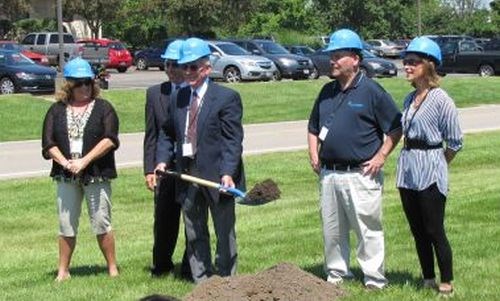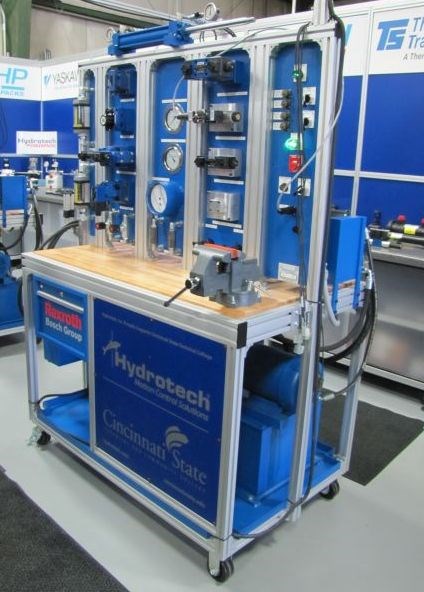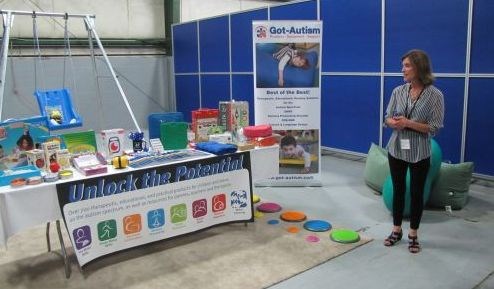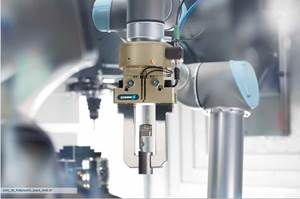Surprises Uncovered at a Groundbreaking
Companies customarily mark new construction with a groundbreaking ceremony. Such an event to celebrate Hydrotech Inc.’s expansion of its suburban Cincinnati headquarters, however, revealed some unexpected facets to this diverse fluid power and automation solutions provider.
Share





The honor of moving the first shovelful of earth at Hydrotech's groundbreaking belonged to CEO/Owner Pete Jones as other Hydrotech executives stand beside him.
Companies customarily mark new construction with a groundbreaking ceremony. Such an event to celebrate Hydrotech Inc.’s expansion of its suburban Cincinnati headquarters, however, revealed some unexpected facets to this diverse fluid power and automation solutions provider.
Because Hydrotech is a local company, taking in its recent groundbreaking was a convenient way for me to get to know the company better. I was partly motivated by the fact that, as the company has expanded, it is branching into areas of growing interest to metalworking companies. These include minimum quantity lubrication systems for environmentally friendly machining and a soon-to-be announced Internet of Things approach to preventive maintenance, for example.
These developments build on Hydrotech’s 48-year history of providing solutions to the hydraulic, pneumatic, lubrication, machining and automation industries.
The groundbreaking marks the commencement of the company’s 23,000 square-foot expansion to its headquarters in West Chester, a northern suburb of Cincinnati. Company officials explained that the expansion is necessary because the firm has grown 14 percent per year since 2010, has hired 35 people in the past five years (with 10 more positions to be added this year), and needs more room for offices and additional factory/warehouse space.
At least three other news items about the company caught my attention because they are not so typical of other groundbreaking events I have covered.
- As a family-owned company, Hydrotech actively supports the Goering Center at the University of Cincinnati. This center offers programs to help family and private companies meet the challenges that can keep them from growing and prospering. Hydrotech benefited from these programs and now mentors other companies that work with the Goering Center.
- Philanthropy is important to Hydrotech, as it often is for family companies who naturally feel compelled to give back to the community and the industry they serve. For example, at the ceremony, the company announced a donation of four new hydraulic training stands to Cincinnati State Technical and Community College. The stands represent a total value of $120,000. This marks the second major donation to this program. Last year, similar pneumatic training stands were also donated.

Four hydraulic training stands like this one are going to Cincinnati State's Electro-Mechanical Engineering program to help train technicians in the fluid power industry.
- Hydrotech has a sideline in educational, therapeutic and practical life products for children and teens living with autism. Called Got-Autism LLC, this business sprang out of an employee’s experience with finding resources for her son, who has a form of autism. With the parent firm’s support and investment, Got-Autism develops and distributes products that encourage individuals with various forms of this disorder to grow, learn and enjoy life. Proceeds go back to local and national autism charities.

Although it may a seem sideline unrelated to industrial hydraulics, company backing has put Got-Autism LLC into the mainstream of providing products and resources that help youngsters with autism.
It didn’t take much digging for me to discover these aspects at the event, but I would probably have missed them otherwise. Unfortunately, I am not able to get to many events like this. I was pleased by what turned up at this one.
Related Content
3 Ways Artificial Intelligence Will Revolutionize Machine Shops
AI will become a tool to increase productivity in the same way that robotics has.
Read MoreLean Approach to Automated Machine Tending Delivers Quicker Paths to Success
Almost any shop can automate at least some of its production, even in low-volume, high-mix applications. The key to getting started is finding the simplest solutions that fit your requirements. It helps to work with an automation partner that understands your needs.
Read MoreCutting Part Programming Times Through AI
CAM Assist cuts repetition from part programming — early users say it cuts tribal knowledge and could be a useful tool for training new programmers.
Read MoreInvesting in Automation, Five-Axis to Increase Production Capacity
To meet an increase in demand, this shop invested heavily in automation solutions and five-axis machines to ramp up its production capabilities.
Read MoreRead Next
5 Rules of Thumb for Buying CNC Machine Tools
Use these tips to carefully plan your machine tool purchases and to avoid regretting your decision later.
Read MoreBuilding Out a Foundation for Student Machinists
Autodesk and Haas have teamed up to produce an introductory course for students that covers the basics of CAD, CAM and CNC while providing them with a portfolio part.
Read MoreRegistration Now Open for the Precision Machining Technology Show (PMTS) 2025
The precision machining industry’s premier event returns to Cleveland, OH, April 1-3.
Read More



































